German Fernandez's historic double
Chronicling 4:00.29 and 8:34.23
Norwalk CA
German's Historic Distance Double: 4:00.29 & 8:34.23 !!!
Riverbank HS senior throws down most prolific distance night in history at 2008 California state meet
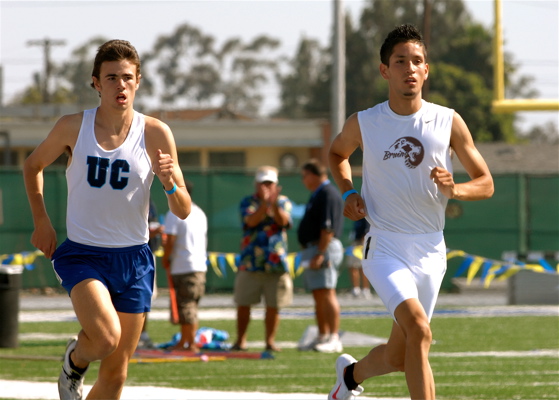
German Fernandez begins to gap Mac Fleet in the 1600.
| 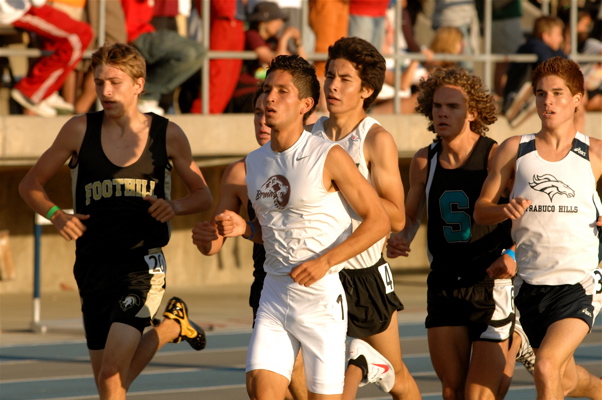
Foothill's Chris Schwartz leads Fernandez early on
| Photos by Rich Gonzalez
By Rich Gonzalez, DyeStatCal.com editor
(NORWALK, Ca.) – This was the biggest mismatch since the Christians faced the lions.
All others in this battle arrived on two legs; German Fernandez arrived on two pistons. The mere mortals entered battle with lean chest cavities that expelled oxygen; Fernandez with a fuselage that spewed rocket fuel. Others tested the laws of lactate threshold; Fernandez embarrassed the laws of logic.
In a matter of seconds, the thin Riverbank High School senior separated himself from the ‘Fleet’ feet (Mac Fleet) and the Foot Locker finalists. In a matter of laps, he distanced himself from the ultra-focused and the overtly aggressive. And in a matter of minutes, thrust himself from message board speculation to meta-historic sensation.
4:00.29 for 1600 meters. 8:34.23 for 3200 meters. Just 0:00.00 needed to sum it up.
Let’s say it all together now, everyone…
Greatest … high school … distance double … ever.
Excuse me to Rich Kimball, who executed his memorable double – and within a tighter race schedule – but required an eternal 10 more seconds to pull off.
Apologies to Jeff Nelson, but German’s feat was achieved wholly from in front rather than while towed along by older and open competition.
Regrets to Ryan Hall, Eric Mastalir and Eric Hulst, whose meet records will never play the same tune again.
“He’s at another level,” said University City’s Mac Fleet, the state sophomore class record holder at 1600 meters from a year ago who decided to discard his tag of 800-meter state leader this year in trying to match Fernandez across four laps on Cerritos College’s Mondo track. “I went for it but he was just too much for me … I shoulda tried the 800 (meters) instead.”
The four-lap state meet record ? Gone by more than two seconds, previously held by a 21st-century distance God (Ryan Hall) who in his following seven years would capture NCAA titles, American records, and an Olympic Games berth.
The eight-lap state-meet record ? Shredded by more than ten and a half seconds and previously held by a pair of Golden State aerobic icons (Eric Hulst and Eric Mastalir) who dazzled in the 1970’s and ‘80’s when distance running was mired in its first heydays.
The national federation 3200m record ? Shelled into submission by nearly seven seconds and previously owned by an eventual NCAA champion and Olympian (Dathan Ritzenhein) who helped fuel the latest prep distance revolution.
The 1600-3200 state championship double drought? Vaporized by an aggregate time 31-plus seconds faster than the last to achieve the feat, in the 1990’s by a phenom (Mebrahtom Keflezighi) who rolled on to American record and Olympic medalist fame.
In short, German Fernandez is a young man far ahead of his time. And his times far ahead of all others.
Perhaps the scariest part of all this ? With more than 10,000 smashed in the stands and planted on their feet during the climaxes of this double concerto, the maestro was just toying with these folks.
“This is going to be a workout for Nike Outdoors in North Carolina in late June, that’s the main focus,” said Bruce Edwards, the astronaut entrusted to be nestled within the cockpit of this supersonic mammal. “That’s the real race we’re looking at.”
As Fernandez’s coach, Edwards had to absorb the second-guessing and finger pointing that infiltrated the national message boards when he was doubling, tripling and quadrupling in trivial meets. Where are those pundits now?
“I’ve had to stop posting on the boards,” Edwards admitted with a wry smile. “People began to think I was crazy. … I can’t blame them, but I do know German well and is unlike most others in what he can do.”
Wait a minute… there area few others as swift as Fernandez across terrain at the prep level? Not rolling along on skateboards? Not sitting behind the wheel of daddy’s Beamer? Not skimming a descent along powdery slopes?
Better contact NASA and give ‘em the news.
With runner-up Raul Arcos in the distant background, Fernandez heads for the 1600m win.
THE 1600: AMERICA'S NEWEST FOUR-MINUTE MAN
With Nike Outdoors Nationals still three weeks away, there were clear goals in play here. Run fast. Recover quickly. Run even faster.
Mission accomplished.
Just minutes after Woodbridge High senior Christine Babcock smothered her own national federation record for 1600 meters, Fernandez jogged to the start line and figured it was ‘my turn’ to take down a record.
“We wanted to come out in about 29 (for the first 200 meters) and then come across about 60 and be fairly consistent from there with an end goal of about 4:02,” said Edwards.
Instead, Fernandez rattled off an opening high 29 followed by a series of 30s, quickly racing himself toward rarefied air on the oval. A 2:00.49 FAT split for 800m, quickly followed by 2:59.10 at 1200, 3:30.2 at 1400m, then the dash for home.
Legs churning, arms pedaling, eyes darting, he give it a final go and careened his torso across the timing beam with the race display clock eliciting a wave of ooooohs and aaaaahs in unison: 4:00.29.
A state meet record and the fastest 1600m race time ever. Also, second only to Allan Webb’s en route 3:59.51 for the national federation (high school meet) record at the 2001 Arcadia Invitational mile.
“I looked up and saw 3:56 (with 25-30 meters to go) and said ‘oh man!’ and went after (sub-four) the last few strides,” said Fernandez, a sheepish grin sweeping across his face. “I wanted to get under four and was soooo close. Man!”
With the meet being beamed live nationally on cable, Fernandez crossed the finish and then crumbled to the ground like a sack of bricks, reminiscent of his uncon-trolled response when he torched Olympian Marc Davis’ state meet course record in cross-country only a few months prior.
Only this time, with the cameras rolling and the crowd howling, a sprawled out Fernandez reached down and clutched the rear side of his right knee while grimacing. Trainers rushed over. Corona High senior Raul Arcos, who finished in a smoking 4:09.65 despite cinders and ashes from Fernandez’s speed propulsion blanketing his face, rushed over to provide comfort as well.
Fortunately, it was just a bad cramp resulting from his body screaming for some sort of mercy, no doubt anguishing its pending date with the 3200m later that evening In the two hours that followed, Fernandez eventually surfaced within the confines of a team tent in the cool-down area, relaxing with coaches and teammates and quick to find the time to playfully tease this reporter once or twice. At times innocently mischievous and always well grounded, his cool demeanor effused any pressures that would otherwise build up.
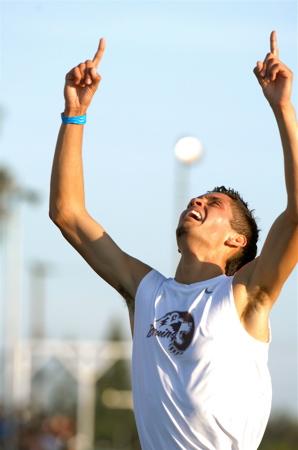 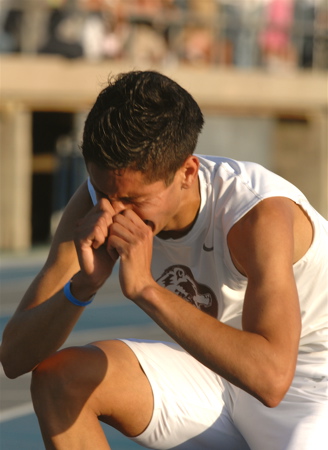 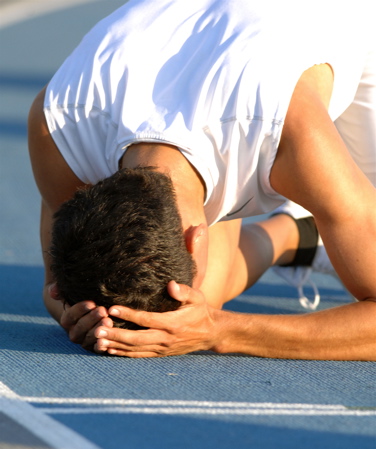 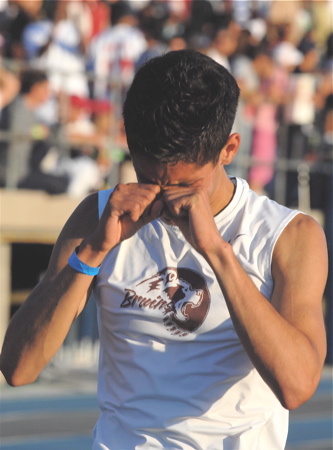
As soon as he crossed the finish line in the 3200m, Fernandez was overcome by a wave of emotions.
THE TOUGHEST TASK: DOUBLING BACK THE SAME NIGHT
By race time for the boys 3200m, the stadium was absolutely buzzing. Temperatures now dropped into the ideal upper 60s range and fans had already witnessed a national girls record at 1600, German’s stunning 4-flat for 1600m and a just-concluded clash between Jordan Hasay and Laurynne Chetelat that produced the second- and third-fastest girls 3200m times in prep history.
The stage was set for more magic. The magician delivered in unparalleled efficiency, his first seven fully automatic timed lap splits never deviating by more than eighty-five hundredths of a second!
His official splits were 64.31-65.14-64.82-64.58-64.29-64.50-65.06, then wheeling home in 61.59 to seal up history, all the while prompting scores of jaws to smash to the concrete in disbelief. Total time: 8:34.23.
Another state meet record and the national federation record.
THE WEB AND THE WEBB
Word began spreading like wildfire. Within seconds of his finish, a cell phone in the finish line dispatched the news to a world-class meet on Randall’s Island in New York. In no time, the hard-line news went from coast to coast. And the message boards instantly became flooded.
“We heard some news about a high school kid last night, but weren’t sure on the details,” said Scott Raczko Sunday morning. In 2001, Raczko successfully mapped out Alan Webb’s bid at Jim Ryun’s national mile record, recording a 3:53.43 sizzler at the Prefontaine Classic.
“What was his time (last night)?” asked Raczko.
“He ran 4:00.29 and 8:34.23,” was my reply over the phone.
“Wait, what was that?”
“4:00.29 and 8:34.23”
There's was quiet slight pause for a half second, and then… “Holy #%@#!”
Raczko appeared temporarily startled by the news then asked what the conditions were like (mid 60s to lower 70s by each race time) and how far apart the races were spaced (2 1/2 hours apart).
“Geez. Those times are incredible. It must have been crazy there.”
Then Raczko was informed that only minutes before Fernandez’s first race, Babcock raced to the girls’ national federation 1600 record in 4:33.85.
“WHAT ??,” barked Raczko. He then spoke to another in the background and said: “They also had a girl go 4:33.85!”
The recognizable voice off phone repeated: “What??”
And two girls ran 9:52 and change for 3200 meters.
“And two girls ran 9:52 and change for 3200m,” he echoed.
The voice off phone was Webb and he responded in the background: “What? Holy $%#*… Hey, what track was it? I want to have a meet on that track!”
“Are you guys using a short track in California?” Raczko asked with a laugh. “Seriously, was that a downhill track?”
But Raczko was not short for words when praising the Californian.
“I’m not as impressed with the 4-flat as I am the 8:34,” he added. “That’s an amazing second half. It shows serious strength. More strength than anyone else we’ve ever seen at the high school level.”
Webb was equally stunned.
“Absolutely amazing,” he replied. “That double… it’s just crazy.”
Chris Solinsky, who knows quite a bit about strength while claiming a pair of FootLocker titles and two Arcadia 3200m titles as a prep before earning five NCAA championships as a collegian at Wisconsin, witnessed it and still didn’t believe it.
“I haven’t ever been impressed with a high school performance, but that was incredible,” said Solinsky who took in parts of the meet on cable TV. “That was insane. I saw the 4:00 (1600) then we left for that border dual meet here in Portland and came back and saw the 8:34. … I mean 8:34 alone is very good but what, two hours after a 4:00? That is unheard of.” | 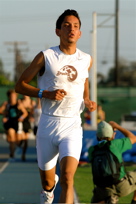 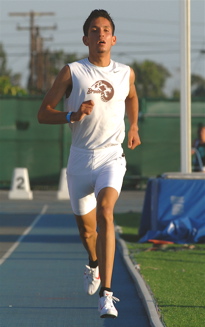 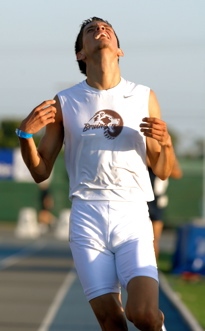 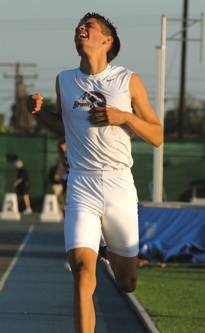 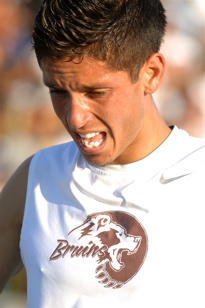
Seen above approaching the 3200m finish, Fernandez joins the likes of Nelson, Ritzenhein, and Co. all all-time list.
| ONE LEGEND GREETS ANOTHER
It was nearly three decades ago that Jeff Nelson recalls he was exiting the track following one of his memorable CIF-SS Masters Meet performances in the late 1979. It was then that a hand extended toward the Burbank HS teen and an unfamiliar face greeted him.
“Hello, I enjoyed see your race. My name is Eric Hulst.”
The name connection was instantaneous. Only three years prior, Hulst capped a brilliant prep distance career while starring at Laguna Beach High.
“That was pretty neat. I’d never met him before but saw his name everywhere,” said Nelson, who clocked a still-standing national open two-mile record (8:36.3) for high schoolers at the Pepsi meet in 1979.
So Nelson admitted he felt goose bumps Saturday night when he approached Fernandez at nearly the same exit area as 29 years before and – once the media attention and fan base had subsided – offered his hand in praise: “Congratulations on your great race. My name is Jeff Nelson.”
According to Nelson, Fernandez hesitated and offered up a blank look.
“I honestly think now that he had no idea who I was and he was wondering,” admitted Nelson with a chuckle. “At first though, I got this look back like ‘I’ve never heard of you,’ I thought maybe he was a bit full of himself but then I’d always heard nice things about him and never had heard he was conceited. That’s when (Nelson said, breaking into laughter) I thought maybe I was the one being full of myself! He seemed like a nice, quiet kid.”
It was only later in the evening that Fernandez was made aware of who he had just met.
Being from a non-affluent background in a tiny Northern California community (four square miles and a population of less than 22,000 residents), Fernandez is your atypical distance runner when it comes to the history of the sport. Like many in this Internet track age, he can probably tell you a great deal about Chris Derrick, Luke Puskedra or future Oklahoma State University teammate Colby Lowe, but ask him what was happening in the sport 5, 10, or 20 years ago and he wouldn’t be able to tell you.
“Not really,” he admitted. That’s just not me.”
Nelson had previously thought Fernandez’s quest for a double would haunt him. He was a lock for the 3200, but anything beyond was being greedy.
“California is too deep in the distances. Look at Chad Hall last year; he tried to double and it cost him,” Nelson surmised. “German was going to have to run a prelim on Friday and then have Mac Fleet waiting for him on Saturday? And then run the 3200? That seemed like a bad decision.
“Then when he ran 4-flat (in the 1600 final on Saturday), I was like ‘holy moly.’ I thought for sure his legs were shredded for any chance at the double. Then he runs 8:34. Mind-boggling. Between that and the great race in the girls 3200 and Babcock’s record in the 1600m, I was getting dizzy. I had to keep rubbing my eyes.”
That sensation did not wear off after getting some sleep.
“I woke up this morning asking myself, “Did that really happen last night?’ That double by him wasn’t human. That’s just, it’s just, I’m at a loss for words. Boy, to run a time like that – by himself! I’m just shell-shocked.”
Nelson’s a full-fledged believer now but wasn’t really sold much on him until this year’s state cross-country meet at Woodward Park a benchmark course that has not changed over the years, offering chances for historical comparison.
“I saw guys like Chris Schwartz and Riley Sullivan in the Division I race and they were really throwing it down,” said Nelson, who still resides in Southern California and has a son that runs varsity cross-country in high school. “Then Fernandez comes in and runs the Division IV race pretty much all alone and just destroys the course record. Wow! I was like, ‘Did he do the back loop?’ “PREFONTAINE, N.O.N., OLYMPIC TRIALS?
The Internet track world is abuzz with interest now, with the support group known as “German’s Army” growing with each new chapter his legs write to the story.
That next chapter could come at the Nike Outdoor Nationals in Greensboro in three weeks, where Fernandez is slated to run the two-mile on Friday night. Also in the race are Puskedra and Lowe, with at least Puskedra likely returning for the mile the next day.
Although highly unlikely now -- his coach rates it as a five percent chance they'll change their mind and ru at Pre -- it could also come in Eugene, Ore. next Sunday when the acclaimed Prefontaine Classic returns to Hayward Field.
Derrick and Puskedra were invited to compete in the same race as world-class stars Craig Mottram, Bernard Lagat, Adam Goucher, Ritzenhein, Solinsky and Co. in that June 8 affair, but Derrick contracted mono and will not attend. Fernandez was also being invited for the two-mile field, with the teenager eager to take part. But his coach cautioned against officially declaring right away, preferring a wait-and-see approach after the state meet double.
“The target meet is Nike Outdoors and the state meet will take a lot out of him,” said Coach Edwards. “He won’t be recovered for a two-mile the likes of a field we’d see at Prefontaine and that would risk injury and totally wear him out for Nike Nationals.”
Edwards knows all about keeping a close eye on Fernandez these days. German performed impressively for Team USA at the IAAF World Juniors Cross-Country meet in Scotland in March, but returned and did a series of consecutive workouts in racing flats that led to a strained Achilles’ tendon malady. Edwards, who also coaches the school’s tennis team, missed enough track practices during that early April stint to be unaware of the situation and blames himself for that injury in retrospect.
With a showdown against Puskedra and others at Arcadia less than a week away, they scrapped plans for the high-profile California-based prep meet. But a phone call came in from Edwards on the opening morning of the two-day meet, indicating Fernandez apparently recovered well enough in recent days to where he’d compete at Arcadia the following night after all.
Then, less than six hours later, Fernandez did a final shakeout run before departing for Arcadia and Edwards’ watchful eye noticed something was not right. He questioned Fernandez, who assured he was healthy and ready to race. But, playing a hunch based on what he observed, Edwards continued peppering his top runner with questions until Fernandez finally came clean and admitted there was lingering pain in the Achilles’ but was eager to race anyway. Edwards nixed the plan, opting a second time to cancel those meet plans.
Because of the 6,400 meters of high-speed racing spread over three races at the state meet this weekend over the course of 26 hours, Edwards strongly leaned against a two-mile at Prefontaine but said they’d perhaps consider doing the mile there if invited. With the Prefontaine meet reportedly already turning away some confirmed 3:57 milers for the field, word was that it was not about to extend an invitation to a 4:05, 1600-meter runner. So it’d likely have to be the two-mile or nothing.
But that was before Fernandez’s 4:00.29/8:34.23 historic double. One meet insider thinks that enough to re-warrant the two-mile invitation, but the grueling schedule on back-to-back weekends would be tough.
In any case, at lease one former prep who starred to a national mile record on the stage that is the Prefontaine Classic thinks Fernandez should still consider it.
“If anything, I’d have to say he needs to pick remaining battles carefully and not over-do it,” said Webb. “Maybe Pre, a race like Nike Outdoors and maybe, maybe one more. But he really doesn’t need the race to be set up for him anymore as it sounds like he can run something like sub-four on his own.
“It’s just up to him if we wants to be Number Five (the fifth high schooler to break the four-minute mile) or be just another very fast runner. When you run as fast as he did, it really just sort of energizes every part of your life. Use that momentum and hopefully keep it going. He might want to go after a qualifying time for the Olympic Trials in the 1500."
The Olympic Trials "B" standard for th event is 3:43.00, roughly equivalent to 3:59.5 for 1600 meters.
In the meantime, Fernandez will return work in his free time as a host and waiter at his local restaurant.
"I proudly work at Applebee's," he quips with a big smile. "My boss tells me I should always mention the restaurant name when I get the chance. He says it's good for business. He gives me time off of work to go to meets, so I'd better mention the name again. It's Applebee's."
The kid is as smooth off the track as he is on it.
|
|
|